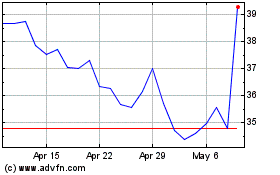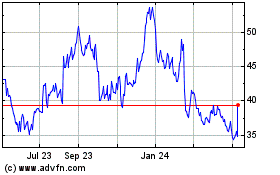By John D. Stoll
Executives from smaller-yet-recognizable American brands came to
Florida this week for an investor gathering armed with a message
for our times: "Made in China" is going out of style.
"Sometimes China is the easiest answer" for companies seeking
rapid growth, Yeti Holdings Inc. Chief Executive Matt Reintjes told
me on the sidelines of the annual ICR conference in Orlando. "But
sometimes it's not the best one for the long term."
Yeti went public in October and shares have risen this month
after strong earnings guidance. Mr. Reintjes's China strategy also
earned the company Wall Street's praise.
Mr. Reintjes touches on a sentiment that has simmered for years
over the low flame of China's rising labor costs, forced technology
transfers and intellectual-property theft. It is now reaching a
rolling boil after Washington and Beijing turned up the heat with
tit-for-tat tariffs.
"Call it the straw that broke the camel's back or the push they
needed," Scott Mushkin, a Wolfe Research covering consumer staples,
said.
As companies set up or modernize their manufacturing operations,
many now prefer to use factories in several countries -- including
higher-cost markets -- in order to reduce the political, economic
and logistical risks that come with too much concentration.
Executives at the conference I attended this week, including
management at Party City Holdco Inc., said they have even moved
some production to the U.S. in order to cut down the amount of time
needed to ship products to stores.
In rooms with names like Mediterranean Salon 4 and Palazzo Salon
D, companies ranging from clog maker Crocs Inc. to teen outfitter
Abercrombie & Fitch Co. faced questions about their exposure to
China. Those with the right answers, like Mr. Reintjes, were
rewarded.
Mr. Reintjes, 43, took over as chief executive of the Austin,
Texas-based Yeti in 2015 following stints at bigger firms,
including conglomerate Danaher Corp. One of the first tasks was to
modernize the supply chain by lessening its dependence on
China.
It was initially designed to be a strategic project, much like
when a company changes its advertising approach or moves from
physical ways of doing business to digital. By putting more
production in the Philippines, for instance, Yeti could take
advantage of a regional supply chain that is less spread out and
better equipped for a growing firm's needs, he told investors,
analysts and other executives Monday.
His company makes high-end outdoor gear originally designed for
rugged fishermen or hunters but increasingly popular among college
kids and suburbanites. Think $400 ice chests and virtually
indestructible five-gallon buckets available in "Seafoam" or
"Desert Tan." These buckets resemble an industrial-sized paint
container, but are made of a rigid plastic that Yeti's website says
is "really damn strong."
Yeti's strategic initiative quickly became a mitigation plan, he
said, when its China-made soft coolers and storage bags landed on a
list of imports subject to $250 billion in U.S. tariffs. Although
it will still make certain products not on the tariff list, such as
travel mugs, in China, it will entirely move production of affected
items by the end of 2019, helping offset as much as a $15 million
financial hit caused by the duties.
It's a long and costly process. Still, Goldman Sachs analyst
Alexander Walvi liked what he heard. After Mr. Reintjes's talk, Mr.
Walvi reiterated his "buy" rating on Yeti shares.
Bill Lewis, a director in AlixPartners' retail practice, says
many companies started rethinking dependence on Chinese factories
as early as 2011 amid a cotton-price shock. Other concerns have
been accumulating since then -- including the labor-cost problem,
political pressures on companies and the rules for operating
there.
For years, many firms were guarded on what they were willing to
say about China plans, Mr. Mushkin, the Wolfe analyst said. "They
are now turbocharging as fast as they can because they don't want
to pay these tariffs."
Chinese exports took an unexpected tumble in December, declining
4.4% from a year ago. Exports had previously enjoyed a nine-month
surge as companies front-loaded orders to beat the new levies, but
analysts say the most recent result could represent a tipping point
as companies selling to American buyers find other places to make
products.
Crocs executives said this week the company imports about 20% of
the footwear it sells in the U.S. from China and could lower that
number if tariffs were to have a meaningful impact.
American corporations are hardly abandoning China. For example,
Crocs is building its growth plans on success in Asian markets, and
that means maintaining a strong presence in China. The company also
makes its shoes in Vietnam, but Chinese factories will play a major
role for Crocs in China and markets around the world unaffected by
tariffs.
For others, it would be too hard to wean themselves from the
extensive ecosystem that has grown to make China the world's
factory floor.
New Jersey-based Movado Group Inc.'s main products -- luxury
watches -- aren't hit by the new U.S. tariffs, Chief Financial
Officer Sallie DeMarsilis told me. (The boxes they are sold in,
however, have been.) Even if manufacturing in China became more of
a financial burden for the company, it would be hard to pull up
stakes due to the complexity of watchmaking and the need for
specialized suppliers, she said.
Still, companies with solid business cases for being in China
may need to rethink their strategy due to pressures coming beyond
the investment community.
Retail giants have leaned on certain brands to look for
manufacturing options outside China over fears that increased
tariffs would lead to higher prices. Walmart Inc., the biggest
retailer, in the summer asked beauty suppliers to look for other
places to make lipstick, eye makeup, shampoo or powders.
Mr. Lewis, the AlixPartners consultant, said there are multiple
ways to offset tariffs, including hitting suppliers with cost
concessions or raising prices. Those methods, though, are
Band-Aids, and consumers and investors are looking for more.
"These companies, especially retailers, have gotten good at
taking their production out of China," Mr. Lewis said. Now China
needs to get better at convincing them to stay.
Write to John D. Stoll at john.stoll@wsj.com
(END) Dow Jones Newswires
January 18, 2019 11:14 ET (16:14 GMT)
Copyright (c) 2019 Dow Jones & Company, Inc.
YETI (NYSE:YETI)
Historical Stock Chart
From Mar 2024 to Apr 2024

YETI (NYSE:YETI)
Historical Stock Chart
From Apr 2023 to Apr 2024
